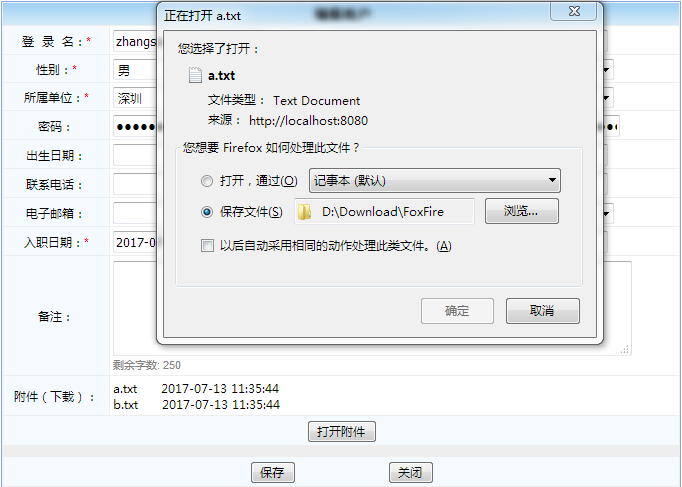页面效果

实现步骤
1.Jsp页面要求
<TD class="ta_01" align="center" bgColor="#f5fafe">附件(下载):</TD> <TD class="ta_01" bgColor="#ffffff" colSpan="3"> <s:if test="elecUserFiles!=null && elecUserFiles.size()>0"> <s:iterator value="elecUserFiles"> <a href="#" onclick="openWindow('${pageContext.request.contextPath }/system/elecUserAction_download.do?fileID=<s:property value="fileID"/>','700','400');"> <s:property value="fileName"/> </a> <s:date name="progressTime" format="yyyy-MM-dd HH:mm:ss"/> <br> </s:iterator> </s:if> </TD>
2.VO对象中添加非持久化javabean属性
//附件ID private String fileID; public String getFileID() { return fileID; } public void setFileID(String fileID) { this.fileID = fileID; }
3.两种文件下载方式
方式一:不使用struts2提供的文件下载(普通方式)
Action类中添加方法:
/** * @Name: download * @Description: 文件下载(普通方式) * @Parameters: 无 * @Return: 无 */ public String download(){ try { //1.获取文件ID String fileID = elecUser.getFileID(); //2.根据文件ID,查询附件表,获取路径path ElecUserFile elecUserFile = elecUserService.findUserfileByID(fileID); //(1)获取路径 String path = ServletActionContext.getServletContext().getRealPath("") + elecUserFile.getFileURL(); //(2)获取文件名 String fileName = elecUserFile.getFileName(); //(3)可能出现中文,解决中文乱码问题 fileName=new String(fileName.getBytes("gbk"),"iso8859-1"); //(4)填写下载文件的头部信息 response.setContentType("application/vnd.ms-excel"); response.setHeader("Content-disposition", "attachment;filename=" + fileName); //3.使用路径path,查找到对应的文件,转化成InputStream FileInputStream fileInputStream = new FileInputStream(new File(path)); //4.从响应对象response中获取输出流 OutputStream outputStream = response.getOutputStream(); //5.将输入流数据读出写到输出流 byte[] buf=new byte[1024]; int length=0; while((length=fileInputStream.read(buf))!=-1){ outputStream.write(buf, 0, length); } outputStream.close(); fileInputStream.close(); } catch (Exception e) { e.printStackTrace(); } return NONE; }
方式二:使用struts2提供的文件下载
第一步:配置struts.xml
<result name="download" type="stream"> <param name="inputName">inputStream</param> <param name="contentDisposition">attachment;filename="${#request.fileName}"</param> <param name="bufferSize">1024</param> </result>
第二步:VO对象中,添加InputStream类型的属性
在模型驱动的对象中,添加InputStream类型的属性主要用来存放文件的输入流,其中属性名称要与struts.xml中定义的inputName的值一致。
//文件下载的流的属性 private InputStream inputStream; public InputStream getInputStream() { return inputStream;
} public void setInputStream(InputStream inputStream) { this.inputStream = inputStream; }
第四步:Action类中添加代码
/** * @Name: download * @Description: 文件下载(struts2的方式) * @Parameters: 无 * @Return: struts2的结果类型 */ public String download(){ try { //1.获取文件ID String fileID = elecUser.getFileID(); //2.根据文件ID,查询附件表,获取路径path ElecUserFile elecUserFile = elecUserService.findUserfileByID(fileID); //(1)获取路径 String path = ServletActionContext.getServletContext().getRealPath("") + elecUserFile.getFileURL(); //(2)获取文件名 String fileName = elecUserFile.getFileName(); //(3)可能出现中文,解决中文乱码问题 fileName=new String(fileName.getBytes("gbk"),"iso8859-1"); request.setAttribute("fileName", fileName); //3.使用路径path,查找到对应的文件,转化成InputStream FileInputStream fileInputStream = new FileInputStream(new File(path)); //4.与栈顶的inputStream关联,将查询的文件输入流放置到模型驱动定义的inputStream属性中,用来输出文件 elecUser.setInputStream(fileInputStream); } catch (Exception e) { e.printStackTrace(); } return "download"; }